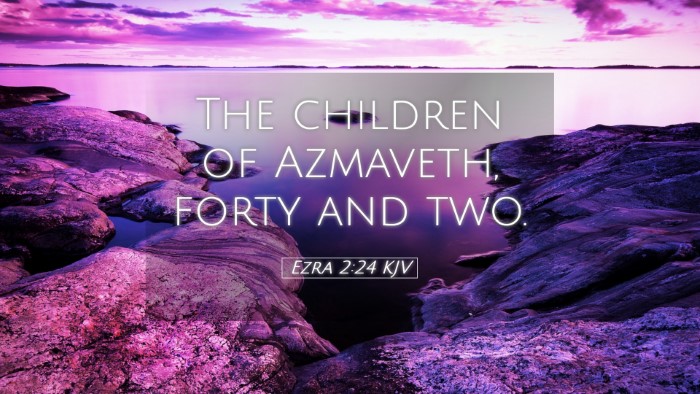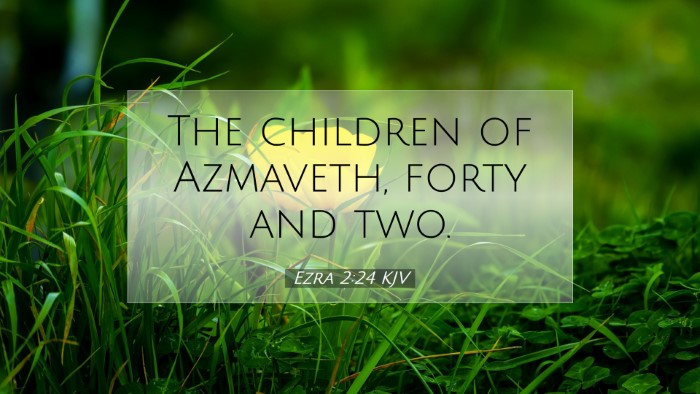Commentary on Ezra 2:24
Ezra 2:24 presents a significant detail in the genealogical history of the Israelites returning from Babylonian captivity: "The children of Delaiah, the children of Tobiah, the children of Nekoda, six hundred fifty and two." This verse, while a mere enumeration of names and numbers, opens a window into the spiritual and historical context of the Jewish return to Jerusalem. Below we explore insights from prominent public domain commentaries, providing a robust framework for understanding the text's implications for pastors, students, theologians, and Bible scholars.
Historical Context
The return of the exiles, including the families listed in Ezra 2, marks a pivotal turning point in Jewish history. After a prolonged period of captivity, the restoration of Jerusalem and the temple is not merely a physical return but a reaffirmation of identity and covenant with God. Matthew Henry notes that these names highlight the divine faithfulness even amid adversity, as families retained their identities through exile.
Significance of Genealogies
Genealogies served multiple purposes in Scripture. They provided legitimacy and heritage, asserting the rightful place of individuals within the community of God’s people. Albert Barnes emphasizes the importance of tracking lineage as a means of maintaining the covenant community. The families returning with Delaiah, Tobiah, and Nekoda signify a restoration of both worship and societal order in post-exilic Jerusalem.
Family Names and Their Meanings
-
Delaiah: This name, possibly meaning "Yahweh has delivered," evokes the theme of divine intervention and protection during exile, while simultaneously reflecting hope for the future.
-
Tobiah: Translating to "Yahweh is good," this name serves as a reminder of God’s character, reinforcing the covenant relationship that was central to the Israelite identity.
-
Nekoda: Less is known about this name, but its inclusion in the list hints at the diversity within the returning exiles, showcasing the various family units that contributed to the resurgence of Jewish life in their homeland.
Spiritual Themes
The count of 652 individuals returning under these names reveals a structure and organization among God's people. Adam Clarke points out that such organization was essential for the re-establishment of both civil and religious life in Israel. The number also speaks to the broader theme of community and the importance of families coming together in worship and service to God.
The Collective Identity
In understanding their collective identity, the returning exiles had to reconcile their history with the present and future of Israel. For pastors and theologians, this resonates with modern applications of church identity and community reshaping in times of change. The families' return symbolizes not just a physical journey but a spiritual pilgrimage back to God’s purpose and promises.
Application for Today
As we reflect on Ezra 2:24, several applications emerge:
- The Importance of Heritage: Church communities today continue to be shaped by their histories. The remembrance of spiritual ancestors provides a sense of identity and purpose.
- God's Faithfulness: Just as He was faithful to Israel, He remains faithful to His people today. This verse encourages believers to trust in God's ongoing work in their lives.
- The Power of Community: The gathering of individuals and families for worship and service remains vital. Modern congregations can learn from the unity depicted in these genealogies.
Conclusion
Ezra 2:24, while seemingly a simple record, encapsulates profound themes of restoration, identity, and divine faithfulness. For pastors and scholars, this verse serves as a reminder of the importance of understanding one’s heritage, the significance of community, and God’s unwavering presence throughout history. As we study the scriptures, we are beckoned to recognize the relevance of these genealogies in our spiritual journeys today.


